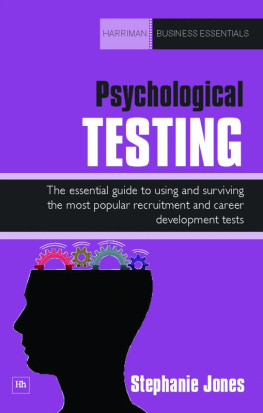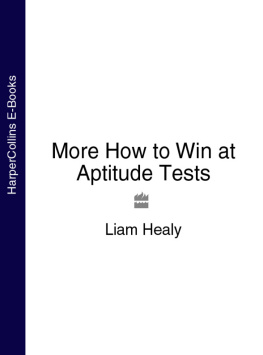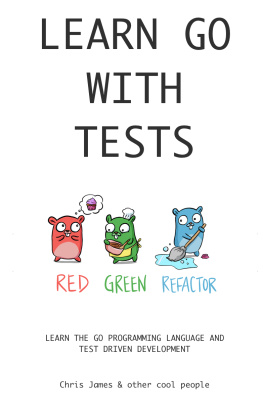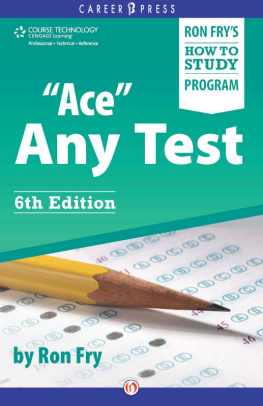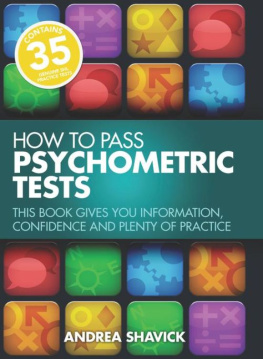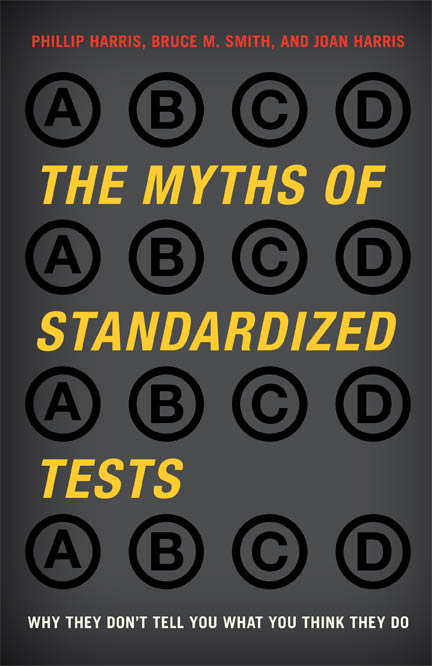
The Myths of Standardized Tests
The Myths of Standardized Tests
Why They Dont Tell You What You Think They Do
Phillip Harris, Bruce M. Smith, and Joan Harris
ROWMAN & LITTLEFIELD PUBLISHERS, INC.
Lanham Boulder New York Toronto Plymouth, UK
Published by Rowman & Littlefield Publishers, Inc.
A wholly owned subsidiary of The Rowman & Littlefield Publishing Group, Inc.
4501 Forbes Boulevard, Suite 200, Lanham, Maryland 20706
http://www.rowmanlittlefield.com
Estover Road, Plymouth PL6 7PY, United Kingdom
Copyright 2011 by Phillip Harris, Bruce M. Smith, and Joan Harris
All rights reserved . No part of this book may be reproduced in any form or by any electronic or mechanical means, including information storage and retrieval systems, without written permission from the publisher, except by a reviewer who may quote passages in a review.
British Library Cataloguing in Publication Information Available
Library of Congress Cataloging-in-Publication Data
Harris, Phillip, 1939-
The myths of standardized tests : why they dont tell you what you think they do / Phillip Harris, Bruce M. Smith, and Joan Harris.
p. cm.
ISBN 978-1-4422-0809-4 (cloth : alk. paper)
ISBN 978-1-4422-0811-7 (electronic)
1. Universities and collegesUnited StatesAdmission. 2. Education,
HigherStandardsUnited States. 3. College applicationsUnited
States. I. Smith, Bruce M., 1949- II. Harris, Joan, 1938- III. Title.
LB2351.2.H356 2011
371.26'4dc22 2010025598
` The paper used in this publication meets the minimum requirements of American National Standard for Information SciencesPermanence of Paper for Printed Library Materials, ANSI/NISO Z39.48-1992.
Printed in the United States of America
Contents
A Medley of Views vii
Introduction: This Is Not a Test 1
Chapter 1. Misunderstanding Accountability: 13
The Big Picture
Chapter 2. The Tests Are Too Narrow 23
Chapter 3. The Tests Dont Measure Achievement 33
Adequately
Testing Autobiography: Phils Story 47
Chapter 4. The Tests Are Less Than Objective 51
Testing Autobiography: Bruces Story 65
Chapter 5. Rewards and Punishments Dont 71
Motivate
Testing Autobiography: Joans Story 83
Chapter 6. The Distortions of High Stakes 87
Chapter 7. Whats Left Out? 99
Chapter 8. Why Not More Direct Measurement? 111
Chapter 9. The Tests Dont Predict Well 119
Chapter 10. New Ideas for Genuine Accountability 133
Chapter 11. Whats It All About? 149
A Resource Guide 169
Notes 173
Say What?: An Abbreviated Glossary 187
Index 193
About the Authors 197
To our families: the Harris clan, Steven, Vicky, Janine, and Katie; the Smiths , Louise, Amanda, and Margaret whose combined experiences and input helped make this book possible. And to the memory of Gerald Bracey who spent decades educating leaders and policy makers about the myths of standardized testing.
Contents
A Medley of Views
Introduction: Reading the Reading Tests, 10
Susan Ohanian
Chapter 1: Misunderstood Measurement Mallets, 20
W. James Popham
Chapter 2: A Use of Tests I Could Support, 31
Gerald W. Bracey
Chapter 6: Within Limits, Tests Can Be Useful, 98
Stanley Pogrow
Chapter 7: Kids or Cows?, Tom OBrien 108
Chapter 8: The Tests We Need Today, 117
Gail Marshall
Chapter 9: A Smoke Screen, Larry Barber 131
Chapter 10: The Game of School, Ken Jones 146
Introduction: This Is Not a Test
[Testing] is the mechanism we have. We may not like it.
Tony Bennett, Indiana State Superintendent of Public Instruction, 2008
T his is an actual emergency. Our schools are under attack, and with them, the future of our young people. Whats more, this assault isnt being perpetrated by some foreign power bent on our destruction. No Red Hand, no Shining Path, no al-Qaida. This assault is coming from within.
Whats worse, the assault on our schools and our childrens future is one we, the people, have allowed to happen and seem powerless to resist. We are referring to the barrage of standardized testing besetting our schools and districts. No Child Left Behind is only its most recent, and most punishing, incarnation. And the Obama administrations proposals for amending NCLB reflect a similarly misguided reliance on test scores as the primary measures of success for students, teachers, and the education system as a whole. For decades more and more tests have been seeping into our schools, sapping the energy and enthusiasm of educators and draining the life from childrens learning. And while some of the motivation for this burgeoning movement is clearly commercial, it is at least partly driven by what we have come to think of as the tyranny of good intentions.
Those are some pretty dire charges, but we argue that, because of the way we insist on using these tests, they damage society in ways that far outweigh the minimal benefits they conferwhether the tests are used for measuring achievement in the K12 schools or for helping to determine admission to college. We hope to persuade you that you need to look beyond the good intentions expressed by those who continue to support this plague of tests, and we plan to arm you with some basic understanding of standardized tests and the assumptionsalmost never discussed in public forumsthat underlie them. As the title of our book suggests, these assumptions are largely mythical. Like myths, they embody a system of beliefs that characterize a particular culture. But unlike myths, we use the assumptions that underlie standardized tests to make policies and drive practices that influence the lives of our children and so greatly affect our future.
If youre experiencing serious dj vu about now, we sympathize. If the thought of reading still more complicated and confusing information about standardized testingincluding all those arcane details about margins of sampling error and reliability coefficientsmakes you want to run screaming from the room, take it from us, were right behind you. So why, then, have we subjected ourselves to the prolonged project of creating this book, and why do we hope that youll agree that the time you give it is time well spent?
The answer lies in that very sense of dj vu. We have all heard the complaints about standardized testing before. Walter Lippmann was among the first to make themin the 1920s. And Banesh Hoffmann, back in 1962, raised serious questions in The Tyranny of Testing about what standardized tests could really tell us about the achievement or the aptitude of our youngsters. (This book has been reissued in paperback, by the way, and is available on Amazon.com and other websites.) More recent critiques have come from Peter Sacks, Alfie Kohn, W. James Popham, Daniel Koretz, Gerald Bracey, and many other commentators and researchers, all sounding off on the proper role of testing in America. Theyve warned us of the distortions that inevitably arise when we ignore the capabilities of our technologies. And theyve told us that many of the test-based inferences that politicians and pundits routinely draw about American schools and children are unsound. In addition, FairTest and its Assessment Reform Network, along with other groups devoted to the rational use of tests, work hard every day to make the limitations of standardized tests clear.
So havent we heard such criticism often enough? Maybe not. Look at that list of names in the preceding paragraph. How many do you recognize? Were betting that most readers will be unfamiliar with nearly all of them, and we think that, as educators, parents, and concerned citizens, you will want to learn more about them and their work. If the messages these commentators have been sending for decades had been received and digested by the public, we wouldnt be asking you to spend a few hours with us and think this problem through. We would all have moved on to the myriad other problems that confront schools and educators every day, problems that wont be fixed by another truckload of test scores.


